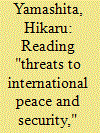| Srl | Item |
| 1 |
ID:
079873


|
|
|
|
|
| Publication |
2007.
|
| Summary/Abstract |
Until the 1870s British officials in China often acted without the Foreign Office's official consent because they could only communicate with London via mail. In the 1870s telegraph lines connected China to Europe. The Chinese government initially opposed foreign telegraph lines arguing that they undermined Chinese authority. British diplomats in China were also wary of the telegraph because it allowed the Foreign Office to intervene more quickly. From the 1880s the telegraph was increasingly used as an instrument of imperialism in China. The Boxer Rebellion in 1900 showed how important the telegraph had become as means of communication
|
|
|
|
|
|
|
|
|
|
|
|
|
|
|
|
| 2 |
ID:
079874


|
|
|
|
|
| Publication |
2007.
|
| Summary/Abstract |
The Progressive Era, from the late 1890s to the entry of the United States into World War One, was marked by a professional commitment to global trade expansion on the part of the State Department and the McKinley, Roosevelt, Taft, and Wilson administrations. Philosophically, the United States embraced the belief that a liberal, democratic, free-enterprise political and economic system would advance human progress on every continent, and that global free trade would remove many causes of war and conflict. Such a policy position attracted young and talented foreign service officers to serve in the American diplomatic corps. One young man was Lloyd C. Griscom, heir to one of the great American shipping fortunes. Griscom's career as a diplomat in Turkey, Persia, Japan, Brazil, and Italy between 1899 and 1909 revealed much about American political and economic interests during a period when the United States emerged as a major power
|
|
|
|
|
|
|
|
|
|
|
|
|
|
|
|
| 3 |
ID:
079875


|
|
|
|
|
| Publication |
2007.
|
| Summary/Abstract |
In the United Nations Charter the notion of the "threat to international peace and security" is designed to play a key enabling role in framing its collective security functions. Taking a 60-year period from the UN's founding, this article examines how the UN Security Council has developed the notion of the "threat to international peace and security" through its resolutions, and what this evolution might mean for the notion of collective security and the Council's role in it.
|
|
|
|
|
|
|
|
|
|
|
|
|
|
|
|